Peter MALONE
After Yang
AFTER YANG
US, 2021, 96 minutes, Colour.
Colin Farrell, Jodi Turner-Smith, Malia Emma Tjandrawidjajaj, Sarita Choudhury, Clifton Collins Jr, Haley Lu Richardson.
Directed by Kogonada.
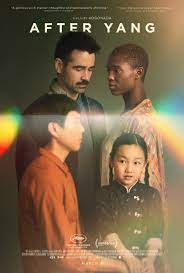 A quiet, very quiet, science-fiction or futuristic fantasy. An invitation to enter and explore a new era of Artificial Intelligence.
A quiet, very quiet, science-fiction or futuristic fantasy. An invitation to enter and explore a new era of Artificial Intelligence.
Who or what is Yang? We first meet Yang with his family, father and mother, mixed race, and the little daughter with visible Chinese ancestry. And Yang seems also Chinese. He is a young man, seems part of the family, pleasant and genial, at meals, happily conversing – with the quiet touch of inherited Chinese wisdom – a wonderful companion for the daughter, something of a tutor, something of a friend, to encourage her with her Oriental heritage.
While this future seems to be a future we recognise, we soon see many technological differences. And this is especially the case when we realise that Yang is a very sophisticated example of robotics, development of androids, the creation of a well-balanced person who resembles a human almost perfectly. But, the title indicates that there might be a crisis, Yang no longer there, and what happens after Yang.
For the little daughter, she is almost inconsolable, despite the efforts of her parents to reassure her.
The mother, a successful businesswoman, seems loving but somewhat detached, occupied with her work, having to go away from home.
The father, is devoted, actually purchased Yang not from the accepted company which produces such androids but, one might say, secondhand (later learning a rather longer history of Yang’s presence). The main part of the action is the father trying to get Yang repaired, going to the company which will not help, trying some means prohibited by legislation, visiting the museum where a curator with specialist interests does her best to restore Yang – although, what is most valuable is the disc with his memories, visible when someone looks at them wearing specialist spectacles, something the father does often, with wistfulness.
And, all the while, there are pleasing flashbacks to Yang, to his friendship with the young woman and the father tracking her down, getting explanations.
Not exactly the material of fast-paced or action-packed pre-apocalyptic sagas. Rather, a gentle, if urgent, story, a family story, of loyalties and hopes.
The father is played by Colin Farrell, his Irish accent and all. His wife is played by Jodi Turner-Smith, the daughter by Malia Emma Tjandrawidjaja and the young girl is played by Hayley Lu Richardson.
- The title? The presence and character again? His absence? The family and having to cope?
- The future, differences from our present, similarities? Homes, workplaces, shops? The museums? The musical score?
- Science-fiction, science fantasy? Not the expected action approach? Genial and gentle?
- The development of AI, robotics and androids, the android practically human? In manner, knowledge, conversation, communication?
- The portrait of the family, the father earnest, his wife and her work, mixed race, the adopted daughter, her Oriental background, the purchase of Yang, his presence, pleasant on the family, conversation, meals? With the daughter, friend, tutor, encouraging her heritage?
- Yang and the breakdown, his body, slumped, the danger for decay? The father having to act and resolve the situation? The background of the purchase, secondhand, discovering more about the previous owners, the visit and the information, only a week, and the previous purchase, the visit to the old lady, the story of Yang in the past?
- The father going to the repair man, the legislation forbidding the repair? The power of the company and preventing any other companies developing techniques?
- Going to the museum, the curator, interest, help and support, the possibilities for restoration, Yang and his physical framework, for the museum, the other exhibits? But the importance of his memories? The father and the collaboration with the curator?
- The importance of the range of flashbacks, the memories of Yang and literally bringing him back to life?
- The father, at home, his daughter upset, her tantrums, trying to calm her down, support? Some tension between the father and mother, her busy with her work, absences, communications, taking the daughter to school, the principal, the daughter and the tantrum and the anger?
- Neighbours, their experience with the androids? The father and his reserve with the neighbours?
- The importance of the memories, their being retained, wearing the spectacles, the father and his delight in watching, the mother, the curator?
- The sadness of the absence of Yang, the concern about his being reconstructed? Not able? How to be remembered, bones and framework in the museum? His memories?
Bubble, The
THE BUBBLE
US, 2022, 126 minutes, Colour.
Karen Gillan, Leslie Mann, Iris Apatow, Pedro Pascal, Harry Trevaldwyn, Samson Kayo, Peter Serafinowicz, Rob Delaney, Guz Khan, Maria Bakalova, Fred Armisen, Kate MacKinnon, Daisy Ridley, John Lithgow, James McAvoy, Vir Das, Nick Kocher, Keegan Michael-Key, David Duchovny, Fred Armisen, Kate MacKinnon, Daisy Ridley, John Lithgow, James McAvoy.
 Directed by Jud Apatow.
Directed by Jud Apatow.
The Bubble is an American spoof, cowritten and directed by prominent director of comedies, Jud At the tail, (featuring his wife, Leslie Mann, and his daughter, Iris). It was covid-19 and lockdowns that were the inspiration for this comedy, how to make a film during lockdown, how to keep the cast and crew in an isolated bubble, the dire consequences – and the comic implications.)
The Bubble will not be to everyone’s taste, even to those who admire the director, and those who enjoy spoofs. At 126 minutes, it does seem rather long – it needs to be sharp and punchy. There is enjoyment in the range of the cast, the sending up of the International hotel staff at the mansion in England where they are all housed. There are temperamental stars and their tantrums. There is the desperate director trying to see the sunny side of everything. There are agents, marriage mixups, executives (including Kate MacKinnon John Lithgow), an end guest spot by James McAvoy, the sound engineers, the photographers, and two of the cast who are dressed neutrally, up on ropes, who portray all the monsters and villains, intercutting with the actors who are all performing in front of the green screen.
The film being made is the sixth of a series of action adventures featuring explorers, confrontations with the dragons – the director having to cope with the complaints of an actor producer, played by David Duchovny who does not exhibit such talents for this kind of spoof, and the actors’ tantrums, with some message about preservation of animals. Amusing, but not particularly funny.
Perhaps the best thing is to make more precise who will enjoy this film. For audiences who do not like spoofs, they are out. For audiences who like some subtlety and irony in their spoofs, there is only a very limited amount of irony here. For those who are not interested in filmmaking, especially under very difficult circumstances, out. For those who do not like action adventures with dinosaurs and dragons, out. For those who think American comedy is far too broad, this will be not to their liking.
Which, in fact, leaves a very limited audience, even among well-wishers to the director and the cast. The Bubble was sponsored by Netflix – which means that it does have quite an outreach.
Adieu Monsieur Haffmann/ Farewell Mr Haffman
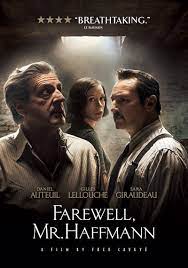
ADIEU MONSIEUR HAFFMAN/FAREWELL MR HAFFMAN
France, 2021, 115 minutes, Colour.
Daniel Auteuil, Gilles Lellouche, Sarah Girardeau, Nicholas Kinski.
Directed by Fred Cavaye.
For audiences looking for a strong and substantial French drama, impressive performances, interesting and challenging plot, Farewell Mr Haffman would be a recommended choice.
There have been a number of films about the Jews in Paris in 1941, especially The Round-up, the decree for all the Jews to be assembled in the stadium, then transported to the concentration camps. However, that is not the subject of this film. Rather, this is a background story. We see the Jews being rounded up in a particular neighbourhood in Paris but we stay in the neighbourhood, focusing on the local jeweller, Joseph Haffman, his work and reputation, the threat of the roundup, his being able to have his wife and three children smuggled out of Paris to the Free Zone, his intending to follow.
In fact, the film, based on a theatre piece, remains mainly in the shop, the customer area as well as the basement. There are some scenes in the street, visits to a pawnbroker, an outing to a restaurant. But, the audience stays with the shop over the period of 14 months, 1941-1942.
While the film recreates the atmosphere of fear for the Jews in Paris, audience attention is focused on Joseph Haffman’s assistant, François Mercier. An arrangement is made that Mercier will buy the shop with money supplied by Joseph and that at the end of the war, everything will be restored. In the meantime, Mercier will have a living and the possibility of developing his ambitions concerning his jewellery skills. Mercier has a young wife, rather morose and diffident, the couple wanting to have a child. They move in and the plan seems to begin well.
However, the drama is in Joseph Haffman not being able to escape, returning to the shop, eventually having to stay in the basement for the duration. There is the continued drama of the German presence, especially when a young officer comes to the store and is impressed by the jewellery (that made by Joseph) and becomes a constant customer, bringing his young French companions. The complication is that the officer wants better jewellery and so Joseph has to work on the pieces down in the basement. Of course, we anticipate that there will be difficulties and, probably, an unmasking.
And, within this basic plotline, there is an unexpected development, François unable to impregnate his wife, and a proposal that Joseph do that for him, his wife initially very reluctant, and François trying to persuade Joseph by promising to post letters from him, something which is very dangerous.
As the young wife, Blanche, tries to come to terms with this proposal, and as Joseph is faced with it, the audience is left to ponder the personal issues, the moral issues, the war conditions.
The screenplay is persuasively written. The central performances are excellent, the always reliable veteran Danielle Auteuil as Joseph, an interesting performance from Gilles Lellouche, usually far more boisterous in his roles but here having to be subdued as François. Audiences may not respond well initially to Blanche, Sarah Girardeau, somewhat nondescriptive as a character but, in fact, the screenplay shows quite a strong development in her in the war crises.
A very satisfying, intelligent and interesting French drama.
- The title, the focus on Joseph Haffman? The Jews in Paris, 1941?
- Paris, the suburbs, the street, the shop, upper, basement? Pawnshops? Police precincts? Restaurants? The musical score?
- Audience knowledge of the Jews in France, the roundup? The elderly sent to the concentration camps? The escapes to the Free Zone? Persecution in Paris itself, the French police?
- The introduction to Joseph Haffman, his skill as a jeweller, close-up on his work, beauty? His shop, clientele, the elderly Jewish clients? His wife, the three children? His devotion? The situation, organising his wife and children to leave, the reluctance, the dollar on the bed for the little daughter to return, the departure and the smuggler? Success? His wanting to organise his business and follow his family? The agent, not able to board the train, the return?
- François as Joseph’s assistant? His talents? The proposal about his buying the shop, his wife, her hesitance, fears? The arrangement, Joseph giving the money, the deal, the document in François’s name? The plan to restore it after the war? François and Blanche moving in, her hesitations, or the comforts of the new house? François and his plan for his work and customs?
- Joseph and his return, staying in the basement, the view from the basement, those passing in the street? The meals, the books, writing letters to his family? The months passing?
- François, his work, Joseph’s jewellery, the German officer, his background knowledge of jewellery, buying the pieces, lavishing them on the French girls, his continued return, others becoming customers? The neighbours and their wariness about François and his contact with the Germans? His wife being wary, refusing to go to meals? François and his increasing prosperity, sales, Joseph’s work, better clothes, the officer supplying better jewels, going to the pawn shop?
- François and Blanche, unable to have a child, the difficulty with François? His idea about Joseph, the proposal, the arrangement that he would post the letters, the irony that he meant the letters and kept the money? Blanche and her reluctance, fears? Eventually going down, with Joseph, being ready? The audience not seeing anything, the aftermath, her work in the laundry, her dislike of the boss, the pregnant worker? Her not being pregnant, François disappointed? The second time, the revelation that nothing happened? The growing respect between Blanche and Joseph, her coming out of her soft, becoming more herself, is asking her about her dreams when she was young, to use a typewriter? The meals, the talk?
- François, going to the restaurant, drunk, the return, the sexual attack on his wife, the irony of her being pregnant? And his being the father? Her morning sickness, the officer, his girlfriends and her help?
- Joseph, a year passing, the episode with the little boy and the ball in the cellar, François ready to confess, not speaking German, bleach to getting the ball and returning it?
- Joseph discovering that François was using the jewels from Jewish families, the pendant that he had repaired? The news that all the Jews had disappeared from the neighbourhood? The fight with François, François locking him in?
- The buildup to the climax, François and the jewels and possessions, the money, Blanche discovering that he had burnt the letters, her reaction? His going to the pawnbroker, changing the ID, having Joseph’s ID as he went to the pawnbroker, held up by the local police, arrest, his protest, Blanche not helping him? His being imprisoned? His later denouncing Joseph, read, but the officer seeing that he was in prison already and throwing the letter away?
- Joseph, coming out of the basement, present with the Germans, the officers suspicions and warning to François? And his acting on this the ID? Locking Joseph again in the cellar, Blanche removing the screws and his getting out?
- The final images, Blanche, changes in her courage, strength of character, looking forlorn? François in prison? And Joseph reunited with his family?
Lost City, The
THE LOST CITY
US, 2022, 112 minutes, Colour.
Sandra Bullock, Channing Tatum, Daniel Radcliffe, Brad Pitt, Da’Vine Joy Randolph, Oscar Nunez.
Directed by Aaron Nee, Andrew Nee.
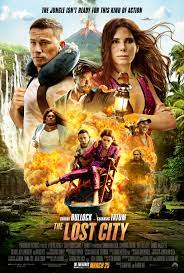 Lost cities in jungle settings. We have been there before! But, we generally enjoy going there again!!
Lost cities in jungle settings. We have been there before! But, we generally enjoy going there again!!
Once upon a time, in fact 1981, there was an academic adventurer searching out relics of antiquity. Everyone knows Indiana Jones. Then, second upon a time, in fact 1984 and 1986, a couple set out on similar kinds of adventures, Romancing the Stone (and Jewel of the Nile). These 1980s adventure fantasies reinforced this genre.
And so, in 2022, former antiquity academic, with a talent for understanding hieroglyphics, who worked with her now deceased husband and still grieving him, who was persuaded to write a series of pot-boiling action adventures, Loretta Sage (Sandra Bullock) is about to set out on a promotions tour of her latest book. The audience is teased by a visualisation of the climax of the book, hero and heroine in a snakepit and then that particular ending deleted!
Loretta is reclusive, has no wish to go on tour but is sometimes literally pushed into action by her agent, Beth, a cheery performance from Da’ Vine Joy Randolph. And the model, who had appeared on the cover of every book, also turns up for the audience, female, there only interest in the launch is seeing Dash, the dashing hero, blonde wig, shirt off… Actually, his real name is Alan, played by Channing Tatum. effectively sending up his screen image with more than a touch of dumb, dumber, dumbest.
A lot could go wrong – and does. First of all, Loretta, dressed in a scarlet/crimson jumpsuit is abducted by a ruthless billionaire, played by Daniel Radcliffe, the script taking advantage of his short stature and making him something of a pipsqueak villain. He has bought an island where he thinks there is hidden treasure and has some hieroglyphics which he wants Loretta to translate. Then, suddenly they are on the island, Loretta bound to a chair, translating, protesting.
Dash, Alan, wants to rescue Loretta and teams with Beth, contacting an expert, Jack Trainer who instantly locates Loretta flying to the rescue, and one of the most action packed attacks on the billionaire and his thugs. It is all is enhanced by the fact that Jack Trainer is played by Brad Pitt – looking as if he is auditioning for a new phase of Indiana Jones films. (And he is not in the film as much as we would like – but, a warning that audiences should not rush out at the first glimmer of final credits because he does reappear!).
From then on, there is rescue, pursuit, dangers, cars over cliffs, shootings, escape by river, climbing mountains… And all the time, some banter between Loretta who is certainly not a cheerful self and poor old Alan whom the screenplay seems to be typecasting as the dumb assistant and then, as he complains, the damsel in distress. Oh, and Beth is on her way for the rescue, encountering a cargo pilot who really fancies her and he does turn up to help in the climax.
Daniel Radcliffe becomes more and more dastardly, recapturing Loretta, Alan in pursuit on a motorbike, by boat to some vast caves, exploration of the caves, a volcano threatening to explode…
A reviewer mentioned the word “cartoonish”. And that seems to be fairly accurate, it is very much a kind of live-action cartoon, action stretching the imagination, some silly situations, some dramatic situations, some comic bantering dialogue.
Which is probably what the audience for The Lost City were buying their tickets for.
- The title, of the romantic novel, Lost City of D – and the explanations of D?
- Audience enjoying this kind of romantic adventure, shades of the Indiana Jones series, memories of Romancing the Stone? A variation of the 21st-century?
- The basic premise, Loretta Sage, academic when young, expert on hieroglyphics, the expeditions with her husband, his death, her still being in morning, reclusive? But her also writing the action adventures? Popular paperbacks? And the hero, Dash, on the covers?
- Loretta, Sandra Bullock, her age, background, reclusive, the novels, Beth pressurising her to the book launch, Alan as Dash, the blonde wig, the open shirt, the audience, the questions for Dash, the swooning women? Loretta and her awkwardness, a glamorous sparkling crimson/scarlet jumpsuit? The compere bewildered, Alan overwhelmed? The past between the two and Loretta rather to staining of Alan?
- Beth, agent, pushy, exasperated, Allison as her assistant, the photos, the plans for the launch?
- Loretta walking out, being abducted, the meeting with Abigail (and his neutral name), his proposal, the document, her refusal to translate, the plane, chloroform, swept away, landing on the island? Tied to the chair, refusing to translate, Abigail and the confrontation?
- Alan, the male model, the touch of dumb and dumber, wanting to rescue Loretta? His contact with Jack, the meditation techniques, medication, instantly locating Loretta, going into action, Alan accompanying Jack, the vehicle, his luggage, told to stay in the car, his following, Jack and the Indiana Jones kind of attack? Rescuing Loretta still tied to the chair? The shootout – and the audience aghast that Jack should be killed and his blood and brains sprayed on Alan!
- The adventures on the island, Loretta in the chair, in the car, the pursuit, the crash, the car over the cliff, their descending, pursued in the water, climbing the mountain, the night together, her lighting the fire, sharing the bunk? The continued adventures, coming to the town, change of clothes, enjoying the respite, the song, the clue for the treasure? Abigail and the men turning up, Loretta abducted again, Alan pursuing on the motorbike, the fight on the top of the vehicle?
- The boat, the trip to the island, going through the caves, Loretta getting through, the others following, the waterfalls, the discovery of the term, the irony of the story of the shells, no jewels or treasure? Abigail and the decision to bury Loretta and Alan in the two? Ray and his defying Abigail, and leaving the tool in the tomb, their getting out?
- Abigail, his back story, family, jealous of his brother, buying the island, fanatical? His thugs, defiant, the big thug and his falling to his death, Ray and his change of heart?
- Beth, the decision to search for Loretta, buying the flight tickets, stranded when the pilot of the small plane was sick, the cargo pilot, the story of his goat, his attraction to Beth, getting her to her destination? On the Coast Guard ship, to the rescue?
- Loretta, understanding and appreciating Alan better, as rising to the occasion, his back story and home and becoming a model? Devotion to Loretta? The final rescue?
- The aftermath, a new novel, and happy ever after? And Jack reappearing in the credits?
How to Please a Woman
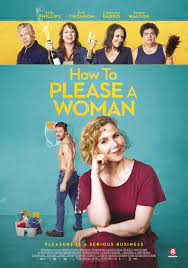
HOW TO PLEASE A WOMAN
Australia, 2022, 107 minutes, Colour.
Sally Phillips, Alexander England, Erik Thomson, Ryan Johnson, Tasman Walton, Myles Pollard, Cameron Daddo, Josh Thomson.
Directed by Renée Webster.
An Australian social comedy about sex (for the male characters) and about sex and sexuality (for the female characters). It has appealed to a female audience, not so much to male audiences (as the main male characters are presented more or less as gigolo dills).
Obviously, all human behaviour can be the subject of comedy, and has been, often very effectively. However, the test is always in the “how” the material is presented.
On the one hand, the serious side, this is a film about women feeling repressed, discarded in middle age, wanting to assert themselves, discover or rediscover their sexuality. On the other hand, the less serious side, this is a film about sex seen as casual, recreational, with the hope that this kind of sexuality will be fulfilling for the women.
Which means then that this is a mixture of the serious and the crass. And, female reviewers and bloggers have been very much in favour.
The plot concerns an English migrant to Australia, Sally Phillips, living in Fremantle, whose busy lawyer husband, Cameron Daddo, has lost interest in sex. And she loses her job, trying to help out a company of removalists which her company has decided to close down. In the meantime, her girlfriends have sent a stripper for her birthday who offers to do everything, anything she wants. She wants him to clean the house. So, this is the comic idea of the men in the removalist company becoming escorts, initially quite inept, needing instruction from the women, but their becoming a professional company – soon overloaded with bookings. The boss of the company, played by Erik Thomson, is a sympathetic older character who raises some questions about the whole enterprise and its repercussions on the personal and sexual level.
So, plenty of scenes with the middle-aged women, enjoying swimming, locker room chatter, experiences with the men, the lawyer husband discovering the truth, the police coming to investigate…
The full meaning of the title is limited to its word “please” for the woman sexually and the men just to move on to the next customer.
Life after Flash
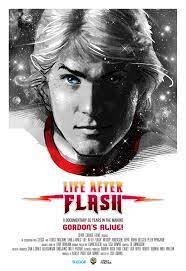
LIFE AFTER FLASH
UK, 2017, 94 minutes, Colour.
Sam Jones.
Directed by Lisa Downs.
A rather exuberant documentary, focusing on the actor Sam Jones who, in 1980, appeared as Flash Gordon in the spectacular Dino De Laurentiis production. While it goes back into the past, to the making of the film, it also traces the life of Sam Jones after this, a celebrity but rather forgotten in terms of cinema, his own personal life, survival – and a healthy ego!
For those interested in the life of celebrities, there are ups and downs, their personalities, there is plenty to enjoy here – if you are on Sam Jones’ wavelength.
For those interested in the history of the film, Flash Gordon, there is a great deal to enjoy. There are many clips from the film, a reminder of its extravagance, the unusual casting, including Brian Blessed, Topol, Max von Sydow. And there is the producer, Dino De Laurentiis, his ambitions at the time, a very hands-on producer, and difficulties with his star.
A special bonus is a reminder of the music of Queen with Brian May being interviewed.
There are quite a lot of talking heads (unfortunately, not Max von Sydow), to keep the audience interested/fascinated. With contributions from Sam J. Jones himself (Flash Gordon), Melody Anderson (Dale Arden), Topol (Dr. Hans Zarkov), Peter Wyngarde (Klytus), Richard O'Brien (Fico), Deep Roy (Princess Aura's Pet), Brian May (Queen) and Howard Blake (composer), with appearances from John Altman (a Hawkman stand-in), Renato Casaro, Richard Donner, Lou Ferrigno, Rich Fulcher, Jon Heder, Mike Hodges (the director), Stan Lee, Christopher McDonald, Paul Oakenfold, Ray Park, Robert Rodriguez, Michael Rooker, Patrick St. Esprit (Jones's friend), Patrick Warburton, and Jones's wife, children and friends.
A commentator referred to the film as ‘essential film geek viewing’.
Everything, Everywhere All at Once
EVERYTHING EVERYWHERE, ALL AT ONCE
US, 2021, 137 minutes, Colour.
Michelle Yeoh, Stephanie Hsu, Ke Huy Quan, James Hong, Jamie Lee Curtis, Tallie Medel, Jenny Slate Harry Shum Jr.
Directed by Daniels (Dan Kwan, Daniel Scheinert). All
\
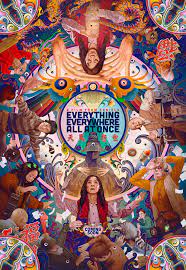 Judging by reviews, bloggers, box office, everyone, everywhere, is wanting to watch this film all at once. And, if you decide to see it, you are in for what they usually call a wild ride. Perhaps it might be better to say wild, weird ride.
Judging by reviews, bloggers, box office, everyone, everywhere, is wanting to watch this film all at once. And, if you decide to see it, you are in for what they usually call a wild ride. Perhaps it might be better to say wild, weird ride.
Before we get to everywhere, there has to be a where. Actually, it is as prosaic as a coin laundry, managed by Evelyn (the ever-versatile Michelle Yeoh) and Waymond (former child star Ke Huy Quan). Evelyn is busy, busy, busy, Waymond worried, thinking of a divorce. They have a visit from their daughter, Joy (Stephanie Hsu), bringing her girlfriend, Becky, exasperated by the hold her mother has over her. And, upstairs, there is Gong Gong, Evelyn’s father (James Hong filming at age 80). So, prospects of a lively domestic drama – compounded when they go off to the IRS building with their tax documentation, encountering a very severe auditor, Jamie Lee Curtis.
But, then the first part of the title comes up on screen, Everything. And, off we go, barely stopping for another two hours of screen time. The two writers and directors, using the common name Daniels, (Dan Kwan, Daniel Scheinert) came into some prominence with their The Swiss Army Man, but they have made a number of short films and videos. They bring all their talents from these backgrounds, a kaleidoscope of ideas and images and music, non-stop. (So far the film has received one award – for Best Editing, Paul Rogers, heartily endorsed by this reviewer, wondering how it worked in the editing room with hundreds of short pieces to be edited coherently. Coherently might be an overstatement but, as we watch the film, it is pacey, exciting, sometimes breathtaking, and unexpectedly working well.
So, off into the multiverse, relying on our familiarity with strange powers in the universe, gizmos for mind control, exciting special effects, and always the unexpected. At one stage one of the characters remarks in an understatement, not typical of the whole dynamic of the film, “I’m a little lost”. And, this is an Odyssey in the multiverse for Evelyn, showing Michelle’s Yeoh’s multi-versatility, serious, dramatic, some martial arts, music, a bewildered mother facing so many of the possible lives she might have led, trying to work out which life she is in, especially with her husband turning up in all kinds of guises, the quiet man at the laundry, a dapper suit and tie gentleman, touches of the android.
And, who is cast as the villain, but Joy. And, as the film progresses, this is a film about family reconciliation, regrets about the past, Evelyn confronting Gong Gong as an evil power and memories of a harsh father, Joy and emotional rivalry.
After about an hour of this, the second part of the title comes up on screen, Everywhere. That is rather misleading because, in fact, we have already been Everywhere. And, it is more of the same, in the different universes, Evelyn’s sudden changing lives, encountering her family in different guises, conflict, resolution, possibilities.
And, by the way, the tax auditor turns up quite a deal, initially fighting with Evelyn, finally becoming reconciled and friends – and a pleasure to see Jamie Lee Curtis again.
When the third part of the title appears on screen, All at Once, it is almost the end of the film, quietening down a bit, reminding us that whatever our existential imaginations might conjure, whatever our cosmology of the universes, we live here, and have to live our lives in our here and now limitations.
Safe to say you won’t find many more films (any films?) Like this!
Postscript 2023, winner of 7 Oscars including Best Film, Director, Screenplay, and 3 acting awards.
- Acclaim and popularity? A cult film instantly on release?
- The work of the directors, their imagination, continually offbeat, visually and verbally creative?
- The cast, their backgrounds in film, Michelle Yeoh, actress, martial arts, Stephanie Sue and television, James Hong and his long movie and television career, Ke Huy Quan as child actor? Jamie Lee Curtis and her career? Audience expectation of their screen presence?
- The title, weird, suggestions of mayhem? Each piece of the title coming up through the film?
- The visuals, the camera work? The importance of the editing, narrative, coherence, pace? The special effects and the imagination? Musical score?
- The opening, the coin laundry, ordinary, Evelyn, the matriarch, the tax accounts, everything busy, the cooking, always in a flurry and hurry? Waymond, husband and father, quiet, unassuming? Gong Gong, his age, Evelyn’s memory of him as a father, his demands, meals, speaking Chinese? Joy, arriving, with Beth has her girlfriend, the embarrassment, her mother’s reaction, her grandfather’s reaction? The confrontation with her mother? The background of organising the party for the grandfather? The customer, can be Knows, inviting her to the party…?
- The visit to the tax office, the demands of the auditor, the documents, want to extend the laundry, Evelyn’s absentmindedness?
- The transition to Everything, Everywhere? Waymond, the gizmo and the connections? On Evelyn’s neck?
- The idea of the multipurpose, the visualising of the multipurpose, the range of locations, exotic, ordinary, in space, cinema settings, opera settings…? A phantasmagoria? The audience response to 2 hours of speeding through the multipurpose?
- Joy and her alter ego, the control of the situation, of her mother? Their appearances together? Joy as herself, as a threat, confrontation, with her father, grandfather, getting Beth’s help?
- Evelyn, her bewilderment, moving from one world to another, trying to cope with her different selves, the possibilities of lives, memories of her father and antagonism towards him, the different personalities of Waymond in the different universes, meek and submissive, coat and tie and poised and unaccomplished? The appearance of the auditor, her pursuit of Evelyn, dangerous? But, ultimately, the friendship, bonding and reconciliation?
- Each member of the family and the different appearances and style in the different lives? And the effect on the audience in being bombarded with everything, moving everywhere?
- The finale, all at once, coming back to Earth?
- The final understandings, concessions, bonding, Evelyn accepting joy and Beth? The future?
- In the excitement of imagining a different lives in the multipurpose, but the reality of having to live in the here and now?
House, The/ Das Haus
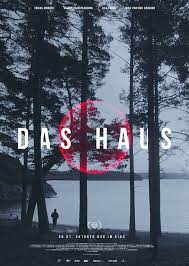
DAS HAUS/ THE HOUSE
Germany, 2021, 90 minutes, Colour.
Tobias Moretti, Valery Tscheplanosa, Hans-Jochen Wagner.
Directed by Rick Ostermann.
The house is a different kind of science-fiction/science fantasy. It has a brief running time.
The setting is 2029, the near future. A more right-wing, fascist-style government is coming into power. Johan (Bertrand German actor Tobias Moretti, The German Lesson) is a journalist who has published against the authorities and is taking refuge, with his wife, an activist, on an island where he has built a very modern house, comfortable, on the sea, but with a swimming pool, and all kinds of technological development.
The wife is in contact with some rebels who eventually turn up at the house but the house turns on them and they are killed. The technology seems to be taking control – but, as the narrative develops, Johan identifies with the house and the house identifies with him, he having control of the house in the house having control of him.
Ultimately, there is conflict with his wife concerning the rebels as well as a visit from his journalist partner who wants to get a story for him for his own advancement, fight, shots.
Finally, there is an image of the wife outside the glass door of the house with Johan inside. She escapes. Johan is identified with and within the house.
- The title? The house as a character, power?
- The 2029 setting? German right-wing politics? The media? Bans and threats?
- The visuals of the island, from above, vegetation, the house, the exteriors of the house, architectural design, beauty, the interiors and the range? The musical score?
- The explanation of the situation, Johan and his being banned, the clash with his collaborator, escaping with his wife, the house, Farhood and his bringing the food, caretaker? The arrival on the boat, self-steered, moving into the house, at home and the house?
- Lucia, her relationship with Johan, love, sexuality, the background of politics, her social activity, the connections with Leyla, phone communication with her? Her support of Johan? The interlude with the cigarettes?
- Settling into the house, the warm shower rather than hot, the explanation that the house had to get to know Lucia? Johan, identifying with the house, his commands? The house identifying with Johan and his behaviour, attitudes?
- The controls, the technology, surveillance? The red eye? The screens? Leyla arriving, Alex, dependence on Lucia? The house and its reaction, the going to the sauna, their deaths? The discovery?
- The technicians, the house resisting change?
- The power of the house, Johan identifying, the situation with Lucia, the arrival of his collaborator, wanting the story, blackmail, the fight, the gun, the shooting?
- Lucia, her reaction, the bag, the truth about her political connections? Her dismay at the deaths? Outside the glass wall?
- Johan, identifying with the house, inside the house? Lucia leaving?
- The long final sequence, Johan, tracking through the house, the island? The future?
Last Execution, The
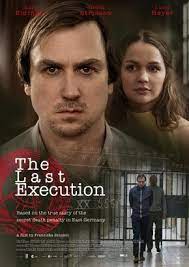
THE LAST EXECUTION
Germany, 2021, 116 minutes, Colour.
Lars Eidinger, Devid Strriesow, Louise Heyer.
Directed by Franziska Stunkel.
East Germany, the early 1980s. The film is based on a true story but with names changed. The director sought the advice of the widow of the central character and showed the film to her for a private screening with the widow not wanting to make any public comment.
Franz Walter is an academic, in a happy relationship, about to travel to Africa for fieldwork before an academic promotion. There are some momentary alarm as he goes on to the plane, authorities arrive, taking him off without any explanation. But, he is recruited to work for the Stasi.
Franz sees this as a great opportunity, he and his partner receive a fine apartment, he goes to the various meetings, is mentored by another Stasi operative, Dirk. The main operation shown in the film is the targeting of an East German footballer who has moved to West Berlin and the authorities want him back, his wife still in the east, their letting the footballer know that she has terminal illness. Walter and Dirk also travel to the west, eye-opening for Walter, revealing the more hedonistic side of Dirk and visits to clubs and meeting women. They contact football professionals to blackmail them to spy. But, Walter sees a beggar in the streets and wonders.
Ultimately, Walter is disillusioned with the methods and the targets, decides on an expose, supported by his partner. However, situations change and he is arrested, charged, brought to the courts for treason. While his defence lawyer puts up some kind of argument for him, he is sentenced to death – not executed in a formal way but shot in the head as he moves through a corridor.
The film then indicates the number of executions that took place in the decades of the East German Republic. The film can be linked with other exposes of life in those decades, especially the award-winning The Lives of Others. Top German actor, Lars Eidinger, is convincing in the central role.
- Based on a true story? Dr Walter Teske, his career, trial, execution?
- German cinema and its interest in East Germany during the communist era? The way of life, repression, the Stasi, espionage, loyalty to the state, trials and executions?
- The title, the audience knowing the outcome from the beginning? Indications of the trial in fast forward early in the film? The dramatic buildup in Franz Walter’s career, action, caution, disillusionment, the personal effect, decisions?
- The focus on Franz? Age, experience, studies? Hopes, the trip to Africa, qualifications? Going to the plane, ordered off, audience suspicions? The news of his promotion? The professor and her recommendation? The interviews, the job, the ministry, secrecy, signed documents? His relationship with Corina, the proposal? Taking her to the apartment, hopes for a comfortable life? The wedding ceremony, the party members present, his and her parents, sense of tension? The gift of the windsurfboard?
- Franz, Dirk, supervisor, loyalty to the state? Franz being employed because of his football connections? The football player, playing in West Germany, considered disloyal to the state, trying to entice him back, his wife remaining, the plan to say that she has terminal illness? The contact with the various players and managers, the player and getting him into a compromising situation with Klara, his spying, giving information, her pregnancy and decisions to be made, Franz persuading her for an abortion, the resistance?
- The football players and managers in West Berlin, wary of the Stasi, blackmailed?
- The effect on Franz, the visit to the west, initial refusal by Dirk, company, the meetings with the footballers? The nightlife, the women, Dirk’s behaviour, perfume for his wife, the death of his child? Franz, seeing the double-edged behaviour, the beginning of his change of heart?
- The meetings, the stern leadership, the plans, deceits, loyalty above all? The visit to the footballer’s house, Franz writing the message on the toilet paper, the later visit, the body in the bath, Franz sick, destroying the evidence?
- The tensions with Corina at home, her not understanding, his not being able to communicate? Silence, drinking? Corina going with Dirk for the windsurfing? The Ministry later suggesting the affair?
- Franz and his plan, collecting the photos, bringing them home, surveillance, showing them to Corina, the death of the footballer, the decision to take the photos back, the officials occupying his office, coming back home?
- The intimations of the trial during the film? The arrest, search and humiliation, the cell, torture with the lights on and off? His lawyer, the defence plans? The stories about Corina and Dirk? The trial itself, the prosecution, the accusations, punishment, the death sentence? The effect on Franz, his speech and plea, the defence by the lawyer? The later visit to the cell, the lawyer unable to do anything?
- The meeting between Franz and Corina, the reunion, the ring with the biro?
- Franz, accompanied throughout the prison, his suddenly being shot? At least not a prolonged execution?
- A true story, the statistics about those condemned to execution during the Communist regime?
Becoming Warren Buffett
BECOMING WARREN BUFFET
US, 2017, 90 minutes, Colour.
Directed by Peter W. Kunhardt.
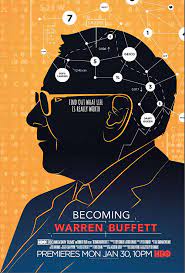 For Americans, Warren Buffett is a well-known financier, the richest man in the United States. However, he has a reputation for good, along with other philanthropists like Bill Gates and his former wife, Melinda. (Bill Gates and Melinda appear during the film, supporting Warren Buffett and his causes, saddening audiences who know of the divorce later).
For Americans, Warren Buffett is a well-known financier, the richest man in the United States. However, he has a reputation for good, along with other philanthropists like Bill Gates and his former wife, Melinda. (Bill Gates and Melinda appear during the film, supporting Warren Buffett and his causes, saddening audiences who know of the divorce later).
There is a framework for this documentary which has been directed by Peter W. Kunhardt, prominent with such documentaries about Martin Luther King, King in the Wilderness, and the television series about Barack Obama. The framework is the older Warren Buffett with a group of intelligent school students, giving them a talk, fielding questions, morale boosting.
The film does offer a narrative of Buffett’s origins in Omaha, Nebraska, growing up there, his skills with money (and the symbol of collecting and benefiting by bottle tops). There is a narrative about his relationship with family, with business partners, his doing without layers of bureaucracy and his company, his friendships and support. There is also the factor of his remaining for so long in Nebraska rather than a move to New York City and Wall Street.
There are some re-enactments and reconstructions of his early life, using an actor, and another actor for him in middle age.
Significant throughout the film are interviews, stock footage because she died in 2004, with his wife, Susan, their love, his support, her finding his business life difficult, moving out to California, yet the constant communication between them. There is also her concern about Warren’s life, the friend who cared for him and became his second wife, Astrid. Also interviews, especially with his son. This insight into his family life, relationships, give some background to the business side of the documentary.
There are explanations of Buffett and his business acumen, shrewdness, reading situations, motivated by success rather than any form of greed. There are testimonies of his partner, Charlie Munger.
Then there is the question of his financial situation within the United States, issues of his company and tax, but the main issues of his causes, the extent of his philanthropy, teeming with other philanthropists and the repercussions on his personality.
The documentary also provides a substantial framework for understanding Buffett’s psychological traits and his consequent behaviour, an emphasis on his being a loner, going to his office, spending time reading, thinking; but he is a man of decision, going to action on business deals. As regards his perceptions, he is highly intuitive, reading situations, financial possibilities, collaboration with partners; although, it is stressed, that he was not particularly adept at reading people at an emotional level. (In the tradition of Carl Jung and the Myers-Briggs Type Indicator, he might identify as INTJ).
An opportunity to appreciate Warren Buffett, his long life, his achievement, his shortcomings, yet a man of character.